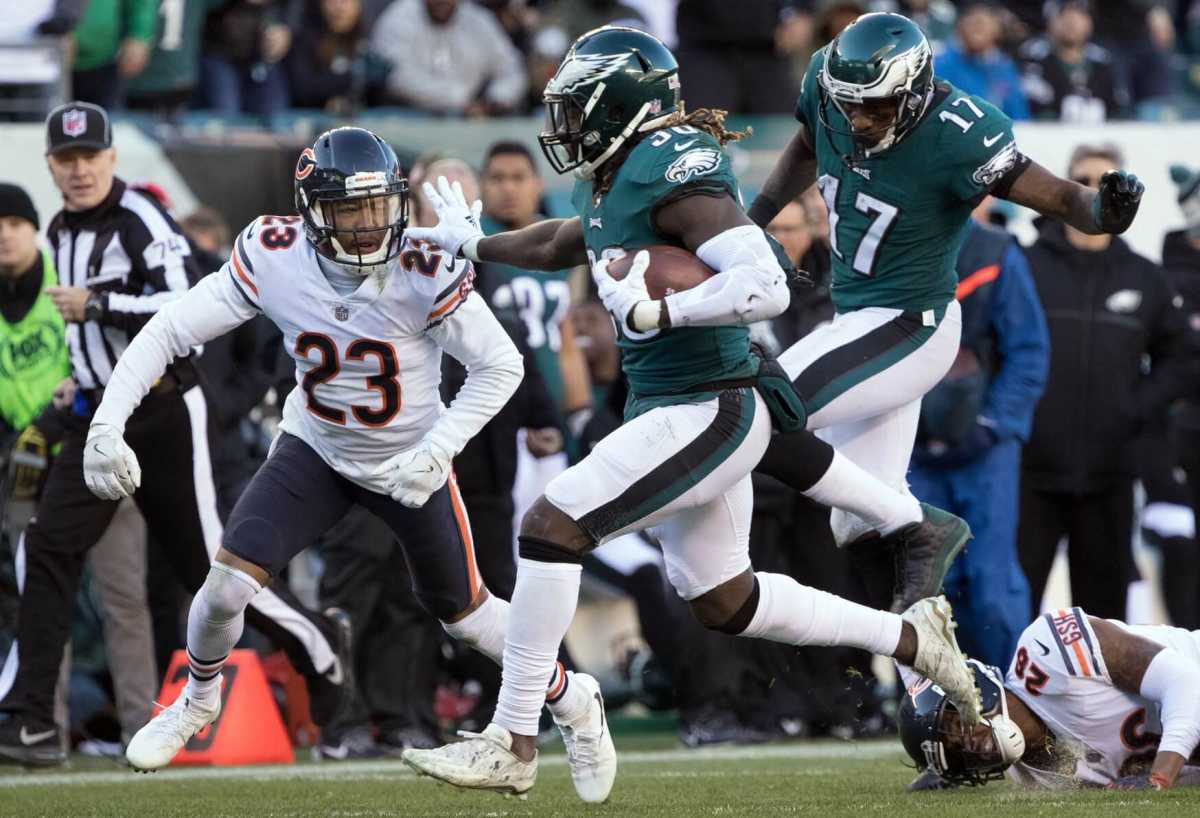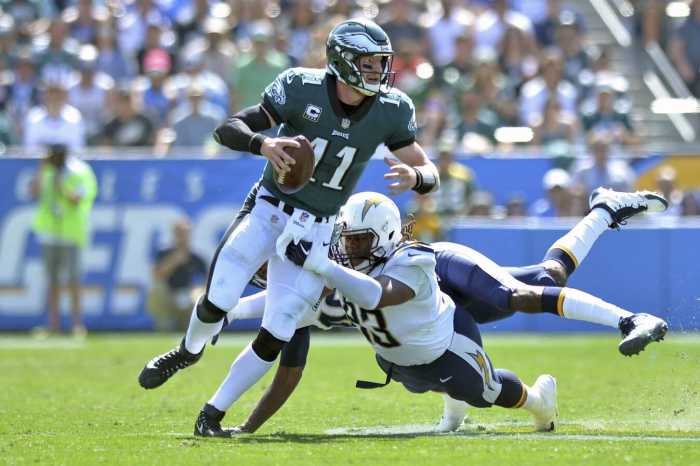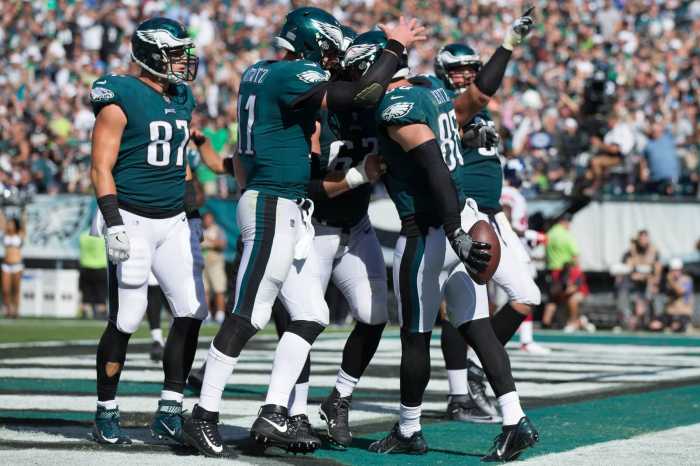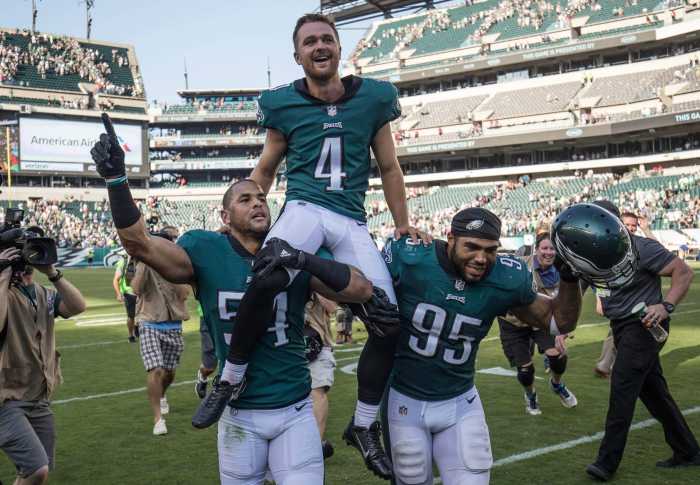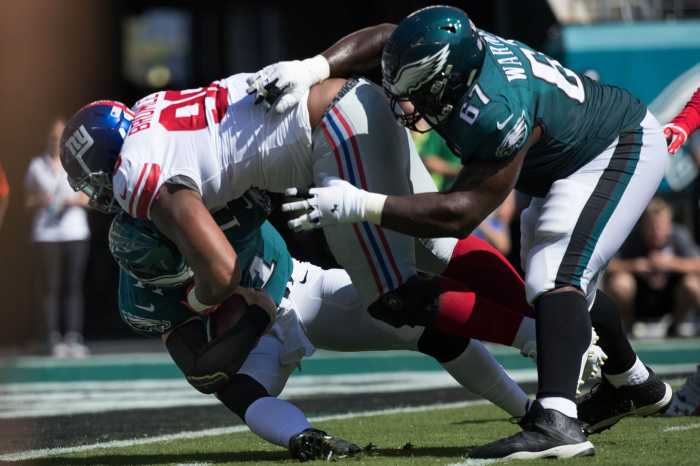For once, everything seemed to be going right for Philadelphia. The Eagles were 10-2, in the top ten of nearly every statistical category on both sides of the ball. They were the best team in football and favorites to win the NFC, if not the Super Bowl. Carson Wentz was putting together an MVP season with a franchise-record 33 touchdown passes with three and a quarter games left to play.
That’s when it all came crashing back down to earth.
With 4:01 remaining in the third quarter and the ball inside the five yard line, the Eagles were looking to take the lead back from the Los Angeles Rams. On first down, Wentz scrambled to his right, dove from the three yard line toward the endzone, crossing the plane but getting crunched between two defenders on his way. Wentz popped back up, with a slight limp but ready to get his teammates back in formation after a holding call nullified the score. Four plays later, on a fourth-and-goal, Wentz stood statuesque in the pocket and delivered an inaccurate pass that was caught inches from the ground by Alshon Jeffery, who pinned the ball to his leg to secure the touchdown. The Eagles took a three-point lead and Wentz had a franchise record for touchdown passes in a season.
Then, the blue tent on the sideline popped up. Then it was revealed that the franchise quarterback was in the tent. Then Wentz walked into the locker room. All the while, Fox was showing replays of Wentz getting hit on the lower part of his body, particularly his legs, on that diving would-be touchdown a few plays earlier.
The report from sideline reporter Erin Andrews sent shivers through every Eagles fans’ body. As Eagles staff exited the locker room where Wentz was being evaluated, Andrews reported, all they could muster was a shake of their heads. Nick Foles was in at quarterback and about 18 hours later, head coach Doug Pederson confirmed the nightmare. Carson Wentz tore his ACL and Foles would be the guy for the rest of the season.
Immediately, shockwaves were sent through Philadelphia and the rest of the league. The Eagles clinched the NFC East with a win against the Rams but the celebration was tempered in the city of Brotherly Love. Another star player lost to injury and the Eagles Super Bowl aspirations were dashed away in an instant.
Not so fast, though. The Eagles, prior to Wentz’ injury, had overcome injuries to All-Pro left tackle Jason Peters, a starting middle linebacker, a game-changing running back, one of the best special teams players in the league and a kicker. Not to mention the game or two missed by other players throughout the season. Through all of that, the Eagles were 11-2. The rest of the team isn’t going to just lay down with Wentz being done for 2017.
As the Eagles enter the winter months with three games in the northeast to finish the season, it is time to play winter football. As the temperatures drop, the Eagles can rely on the league’s second-ranked rushing offense and fourth-ranked total defense to close out the season and into the playoffs.
Late in the offseason, the Eagles added LeGarrette Blount. Undrafted rookie Corey Clement was battling for a roster spot in late August and now is second on the team in carries. On Halloween, the opportunity presented itself for the Eagles to add another running back and Howie Roseman pulled the trigger on a trade that sent the fourth-round pick the Eagles acquired in the Sam Bradford trade to Miami for Pro Bowl running back Jay Ajayi.
Since the trade, the Eagles have implemented a three-headed rushing attack that has averaged 165 rushing yards per game over the last five games. That three-headed rushing attack will help to determine how far the Eagles can go in the playoffs.
With a change of scenery, Ajayi has seen his average yards per carry skyrocket from an impressive 4.3 to an eye-popping 7.0. In his first three games with the Eagles, Ajayi had runs of 46, 71 and 30 yards. His 71-yard run against the Dallas Cowboys is the longest of his career.
It seems as though every time Ajayi gets the ball in his hands he is picking up chunks of yards. Ajayi is coming off of his busiest game since the trade, carrying the ball 15 times for 78 yards against the Rams. It was his third game as an Eagle that he had at least 70 rushing yards.
Ajayi is no stranger to being a workhorse back. While at Boise State, Ajayi was named All-Conference in 2013 and 2014. In those years, he averaged 19.2 and 24.8 carries per game, respectively. In his Pro Bowl 2016 season, Ajayi averaged 17.3 carries per game. Even this year in Miami, Ajayi was averaging 19.7 carries per game before the trade.
While head coach Doug Pederson says the offensive game plan won’t change much with Nick Foles in in place of Carson Wentz, the temperatures are dropping and the Eagles need to help Foles by establishing an effective run game early and often.
LeGarrette Blount can assist in those efforts as well. In his career, Blount has played 30 games in December and January, averaging 55 yards per game with 15 touchdowns and 4.4 yards per carry. At the ripe age of 31, Blount is sporting his best yards per carry average since 2013 and the second-best of his career.
While Blount and Ajayi share a similar running style – basically destroy the guys attempting to tackle you – rookie Corey Clement offers a change of pace and more agility than the two backs ahead of him.
Clement, though, has a nose for the endzone when the Eagles get inside the red zone. All six of Clement’s touchdowns have come from inside the 15-yard line. He also has the third-most touchdowns on the team and twice as many as any other running back on the roster. Not bad for an undrafted rookie. Clement is also lethal in the pass game, averaging 14.5 yards per reception. While he only has eight receptions, his average is second on the team behind only fellow rookie Mack Hollins.
The run game has helped the Eagles secure the top position in time of possession, holding the ball for 33:35 per game, nearly a full minute more than the second-ranked team. Continuing to hold the ball will help keep the defense fresh and doing their thing.
Riding the run game makes sense not only with Foles being in at quarterback, but also given the point in the season the Eagles are at: a win away from securing a first-round bye week and two wins from securing home-field advantage throughout the playoffs.
The Eagles defense will also be important in securing home field advantage. When the playoffs begin, they will need to step it up yet another notch.
Safety Malcolm Jenkins gave a heartfelt speech following the Eagles victory in Los Angeles. “Carson being out, that’s going to be tough. But dig this. We set this up so that whoever is in this room, that’s who we ride with, man. We said it: ‘We all we got, we all we need.’ … At the end of the day, we’ve got bigger goals. You know what’s in our minds: championships and that’s it. Nothing short of that. No excuses. Don’t fucking blink.”
Jenkins has been a leader on the defense that is allowing the sixth fewest points and fourth fewest yards per game in the NFL this season. The secondary has also been a catalyst for the fourth-lowest passer rating allowed, the third-most interceptions and a +8 turnover differential.
The strongest point of the defense is undoubtedly the front seven. The Eagles are allowing just 71.2 rushing yards per game, 17 yards per game less than any other team and the lowest average allowed by any team since the 2014 Detroit Lions.
I could keep rattling off statistical categories that the Eagles defense ranks in the top-ten in (it’s nearly every one) but the defense does the talking for themselves. This Eagles defense is the best in recent memory. Despite beginning the season with “no starting cornerbacks” and losing the heart of their defense and one of the best young linebackers in the game in Jordan Hicks, the defense has answered the call at every opportunity.
A sign of a good team is the opposite side of the ball picking up when one side is slacking. In Sunday’s victory on the west coast, both sides needed to step up as time wound down in the fourth quarter.
With less than ten minutes to go in the game and the Eagles down one, the Rams were driving looking to widen the gap. The Eagles defense had something to say about that. On a first down play, defensive end Chris Long sped around the right tackle and got to quarterback Jared Goff, forcing a pivotal fumble. The ball was recovered by Rodney McLeod. Seven plays later Jake Elliott booted it through the uprights which would ultimately go on to be the difference.
That defensive series is a microcosm of how the Eagles season has gone. When the offense slips and needs the defense to step up, they do. And vice-versa.
Now, with the league MVP sidelined for the remainder of the season, the defense will need to play on another level. Foles won’t put up the league-leading 31 points per game that Wentz was leading the Eagles to.
The Eagles aren’t a team to fold in the face of adversity. They have overcome every injury so far and the story of the 2017 Philadelphia Eagles has been and will be remember as “next man up.” From Darren Sproles to Jason Peters to Caleb Sturgis to Jordan Hicks and now Carson Wentz.
When losing an MVP, the “next man up” for the Eagles will take 14 men to make up for it. The eleven men on defense and the three-headed rushing attack will determine the outcome of the 2017 Eagles season.
Follow Brenden on Twitter @BrendenP_NFL
Mandatory Credit: Bill Streicher-USA TODAY Sports

